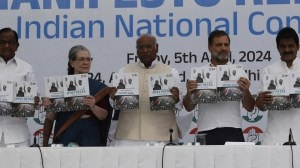- India
- International
Rethinking e-learning, Pune zilla parishad to launch app, varied content
Envisioned to grow into a rich knowledge-transfer system with any-time-access, the digital learning programme will simultaneously focus on self-learning through weekly workbooks or assignments to promote learning through problem-solving or doing, and teachers reviewing this work electronically.
 Teachers have been trained to prepare e-learning material, including PowerPoint presentations and simple audio visuals with voice-overs.
Teachers have been trained to prepare e-learning material, including PowerPoint presentations and simple audio visuals with voice-overs.
Around 1.6 lakh students in over 2,000 zilla parishad schools of Pune district will embrace a new system of video-recorded lectures, audio visuals, animation and graphics as well as other e-learning content provided by private entities, all to be available as an array of content options to choose from for every topic within the syllabus.
Envisioned to grow into a rich knowledge-transfer system with any-time-access, the digital learning programme will simultaneously focus on self-learning through weekly workbooks or assignments to promote learning through problem-solving or doing, and teachers reviewing this work electronically.
Pune zilla parishad school students from classes III to VIII will likely adopt the new e-learning system from July 15, with administrators racing to ensure Internet connectivity even in remote villages through the Bharat Net fibre optic network.
Principal of Pune’s District Institute of Education and Training (DIET), Dr Kamaladevi Awate, said this overhaul of e-learning material will supplement the online classes. “We have split the syllabus in all subjects for classes III to VIII into 30 weeks each, or 150 academic calendar days. Done along with SCERT (State Council of Educational Research and Training), each week’s syllabus has specific learning outcomes. Week-wise e-learning material is being prepared by teachers,” Awate said.
While ZP school teachers are undergoing training to adopt the new system, selected teachers are delivering lectures in a classroom at Pune’s Yeshwantrao Chavan Academy of Development Administration that are being video-recorded.

Other teachers have been trained to prepare e-learning material, including PowerPoint presentations and simple audio visuals with voice-overs, in coordination with the Pune DIET. In addition, Request for Proposals is to be floated seeking private e-learning companies to provide digital content for each topic in the syllabus.
Thus, within the fixed framework of the syllabus, varied content will be available for students to select from. The system will also include a question bank from which randomised test questions will be sent to every student every week, though passing the tests is not mandatory as per state guidelines.
With students accessing study material and attempting the tests through an online platform and an Android mobile application that is ready, daily data analysis will be possible to understand which content providers’ e-learning material seems most popular for a topic and how many hours students are spending on various materials, among others, while the weekly test also allows monitoring of learning outcomes.
Eventually, the ZP administration hopes to build in features such as thumbs-up and thumbs-down feedback by students for various content providers’ materials on every topic.
Pune ZP CEO Ayush Prasad said the new system would on the one hand provide an all-new system of digital learning where the student does not merely attend online classes on an app but can instead be freed from limitations of class hours, and on the other hand, it will actually make the Internet a system for public good.
“Digital education in the new world cannot simply be online classes or digitising a textbook. We are altering pedagogy through creation of activities that promote self-learning. The learning curve of the class, and the learning curve of a single student can both be systematically plotted through the software,” Prasad added.
For villages in connectivity shadow regions, the ZP is counting on BharatNet, previously called the national optical fibre network, whose work was kicked off in 2012 by the Bharat Broadband Network Limited to provide broadband connectivity to rural India.
Of the 1,405 gram panchayats in Pune district, 862 have BharatNet fibre optic cable already laid and at least 605 have actual connections in use, mostly for gram panchayats’ use. “The good thing is that these 862 cover most remote areas where other Internet service providers may not be present,” said Sandip Kohinkar, deputy CEO of the ZP.
Routers, up to four per gram panchayat, were already under procurement after being sanctioned by the District Planning and Development Council last year. The administration hopes that in a few months, students in all 1,405 gram panchayats will be able to use WiFi for e-learning, either from their homes or at a public place in the village. While gram panchayats may fix a tariff and charge others for use of the WiFi, it will be free for students since gram panchayat funds can be used towards free education.
However, an estimated 40 to 45 per cent of ZP school students in the district do not have a mobile phone or a laptop or other device to access the e-learning system. The ZP is now looking for 75,000 new or used tablets, smart phones or laptops. “We have asked people to donate smart devices so that every student is able to access a digital library of content without the restrictions of class hours,” said Prasad.
Other challenges remain, including inadequate data space on old or cheap devices for offline access to downloaded study material, gearing teachers to give electronic feedback to students even via WhatsApp for now, and more generally, just finding wide support among parents, students and teachers for a new system.
Also, if the ZP is unable to procure an adequate number of donated devices, thousands of students will have to depend on schools’ computer laboratories and gram panchayat computers, a process that cannot be seamless. Early content on the app could also be a little rudimentary.
But as a first radical and systematic, district-wide change in digital learning in Maharashtra, officials at Pune ZP and DIET said the experiment is exciting. “We are open to more innovations in the future. As we get more content from private providers, maybe next year we could explore an advertisement-based model to generate funds to pay for it,” Prasad said.
Apr 25: Latest News
- 01
- 02
- 03
- 04
- 05








































